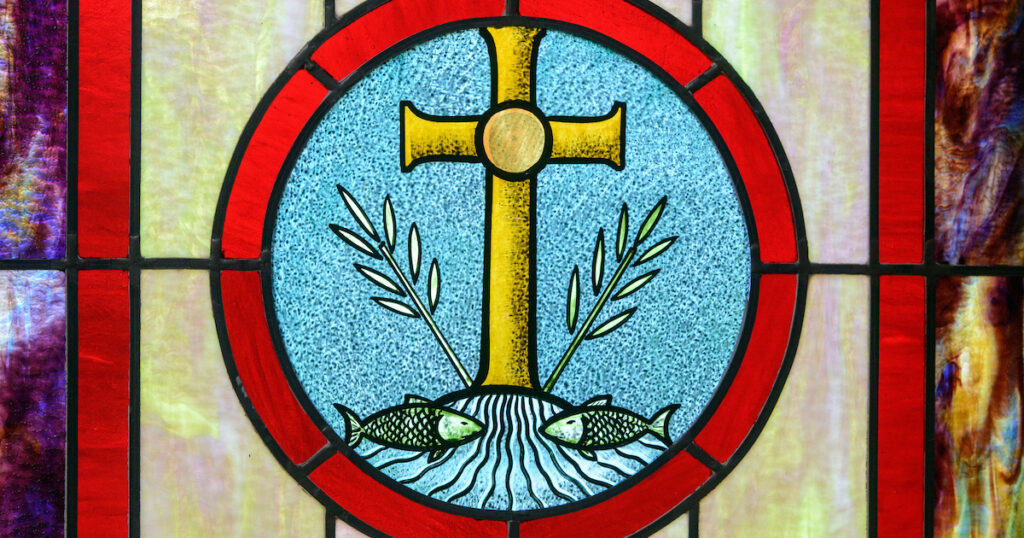You can tell when someone does something halfheartedly. They lack drive, interest; sometimes they emit an audible sigh. No go, no push, no effort. It’s easy to see a halfhearted effort, but the reasons for it lie somewhere hidden. Maybe the halfhearted basketball player was paid to throw the game. Maybe his dad died today. Maybe he’s too sick and shouldn’t be playing. Who knows?
You can sympathize with halfhearted effort. Perhaps you’ve halfheartedly gone to work or halfheartedly crawled out of bed in the middle of the night to get the baby. You understand that life is complicated, talk is cheap and you don’t want to explain yourself all the time to your boss or anyone else who’s trying to guess what is bothering you.
Cheerful giver?
Since we know all these things, it’s all the more surprising to find Paul telling us to give our gifts in the church and for the church from our whole heart or “cheerfully” (2 Cor. 9:7). Why does that matter? Wouldn’t it be objectively better for the church if a couple billionaires gave 0.1 percent of their net worth to the church in a halfhearted way than if a couple thousand people with an average income gave 0.1 percent of their net worth wholeheartedly? Isn’t a halfhearted effort from Larry Bird or Michael Jordan better for any basketball team than a wholehearted effort from an eighth grader? Paul faced many adversities in his ministry, so many that when he began to list them in a foolish competition with his nemeses, the “super-apostles,” he chose only a small selection of the problems, miseries and troubles he’d faced. He knew how many different problems a person faces, how many explanations could be given for why someone didn’t do as much as they could have done or didn’t give as much as they could have given. There is nearly always some good reason why.
So when he spoke about the giving of gifts, Paul didn’t beat around the bush. We all want to be good people, we all have too little time on our hands and we all wish we had more time and more money to do more good. The issue isn’t the amounts of time, money or goodness we might have,but about the one heart we do have (2 Corinthians 8–9).
Undivided heart
That one heart is not divided; it belongs wholly to Christ now. There may have been a time you can remember when you weren’t a Christian. It doesn’t matter how long you have belonged to Christ. It matters only that you do, that you are His and He yours.
The excuses we tell ourselves about giving are not of interest to Him. The fact that the world is more hostile to His Gospel than when you were born or that the financial challenges pastors and congregations face are mounting in number and in difficulty are not good reasons for halfhearted giving.
To whom so much has been given the Lord will also require much.
There have been hard times before. Think about the beginnings of our Synod. Our churches were faced with enormous distances separating Christians from established churches and from faithful pastors. People moved to unsettled land, they had no pastors there and the church struggled to keep up with change. Nonetheless, the people called for pastors, and pastors came. The Lord answered the prayer for more workers for His harvest. The harvest was gathered in, even if it meant the church was built before the people could move out of their sod houses into log cabins or something nicer. You can still find them all across our country: these beautiful old churches built at great sacrifice by people whose children did not wear shoes in warmer months.
Lavish gifts
The problem in giving is not the gifts the Father has given. He is so lavish in His giving that our riches are an embarrassment. If you asked me to tell you all the gifts the Father has given me of every kind, of love, of health, of talents, of money, of time, of all things, time would fail me to tell you all of them. I’d have to make a small selection to spare you, and I’m sure you’d have to make a selection as well. We would never be done with listing off either His mercies or His gifts to each of us.
We don’t need to make lists, but if we lack a lively sense of all His gifts, maybe a list would be good. Maybe a list not of Paul’s sufferings but of God’s enormous mercies and gifts would do far more for our hearts in the darkest days than anything else. Listing off all that God has given to you, your family, your church and all of us would show you how much you have and thus how much you have to give for the sake of His Gospel. To whom so much has been given the Lord will also require much.
Widow’s mite
That’s why the story of the widow and her mites in the temple box moves all of us so deeply (Mark 12:42–44; Luke 21:1–3). The issue with gifts, giving, money and all the rest is not about quantities. The wealthy whom Jesus and His disciples saw giving to the temple were giving out of great quantities, enormous amounts doing objectively more for the temple’s accounts than anything a widow could give. But that doesn’t matter. Giving is an issue of hearts, of which everyone has only one, the same quantity for rich and for poor. Out of that one heart, the widow gave her all.
Let your heart rest wholly on His promises.
Why? She understood God’s desire for hearts, not coins. He is Maker of all things. He is not in need. The multitude of sacrifices in the temple were nothing to Him without a broken and contrite heart, which He never despises (Psalm 51:17). The widow knew these things, and her giving showed it. Her giving confessed her faith — that she was entirely the Lord’s, entirely in His care, entirely entrusted to Him and entirely trusting Him to be faithful in His love and care.
An accounting
Make an accounting of your giving to the church, your family, your vocations. Make a list of the Lord’s gifts. Calculate how much time and money He has given you. Then consider the Gospel as your primary investment. Give the first and best to that investment. You will reap what you sow; sow for the Lord’s harvest.
When you have done all that, say, “We are unworthy servants; we have only done what was our duty” (Luke 17:10). You may have given much, but that is simply what God has commanded. That is enough. The quantity of your giving does not matter. Instead, everything rests on the heart, undivided giving, undivided love for the Lord and His people, undivided trust in Jesus.
Let your heart rest wholly on His promises. Rest in the One who gave Himself for your sake. How, in giving you His only Son, shall the Father not graciously give you all things (Rom. 8:32)?






This is a message which should be preached in every LCMS congregation. The pastors must also speak boldly and directly to their congregation about shortfalls in giving, and explain the financial needs of the church, itemizing the expenses. Many people just don’t know how much giving has declined, especially since the Covid quarantine, and more than a few will rise to the occasion when told about the needs.